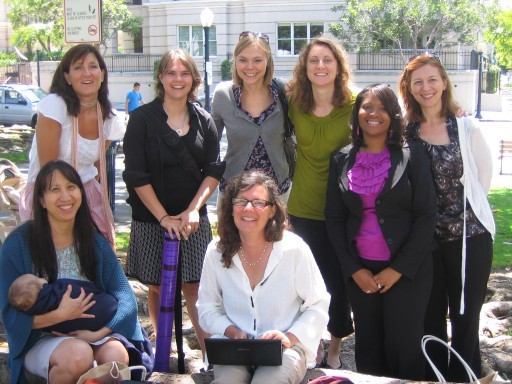| |
Presentations by members of the Freyd Dynamics Lab at
the
|

Lab Reunion, San Diego, 14 August 2010.
Pictured (back): Lisa Cromer, Laura Kaehler, Christina Martin, Bridget Klest, Robyn Gobin, Rachel Goldsmith
(lower): Shin Shin Tang and Mason, Jennifer Freyd
Not pictured but also at APA 2010: Carolyn Allard, Melissa Platt, and Anne DePrince
Posters, & Presentations APA 2010
Freyd, J.J. (August, 2010). Disclosing Trauma: Research and Implications. Invited address for the 118th Annual Convention of the American Psychological Association, San Diego, California, 12-15 August 2010.
Tang, S.S. & Freyd, J.J. (August, 2010). Gender Differences in Posttraumatic Stress: Betrayal Trauma and Gender Roles. Paper presentation at the 118th Annual Convention of the American Psychological Association, San Diego, California, 12-15 August 2010.
Tang, S.S. (August, 2010). Prevalence of Childhood Trauma among Asian Pacific Islander Men and Women. Paper presentation at the 118th Annual Convention of the American Psychological Association, San Diego, California, 12-15 August 2010.
Kaehler, L.A., Freyd, J.J., & Goldberg, L.R. (August, 2010). Betrayal Trauma and Borderline Personality Characteristics: Gender Differences. Poster presentation at the 118th Annual Convention of the American Psychological Association, San Diego, California, 12-15 August 2010.
Martin, C.G., Cromer, L.D., DePrince, A.P. & Freyd, J.J. (August, 2010). Trauma Appraisals and Betrayal: Support for the Brief Betrayal Trauma Survey. Poster presentation at the 118th Annual Convention of the American Psychological Association, San Diego, California, 12-15 August 2010.
Klest, B., Freyd, J.J., Hampson, S.E., & Goldberg, L.R. (August, 2010). Trauma, Social Context, and Self-rated Health Over Time. Symposium presentation at the 118th Annual Convention of the American Psychological Association, San Diego, California, 12-15 August 2010.
Platt, M. & Freyd, J.J. (August, 2010). Shame, Dysfunctional Attitudes and Trauma: An Exploratory Study. Symposium presentation at the 118th Annual Convention of the American Psychological Association, San Diego, California, 12-15 August 2010.
Freyd, J.J. (August, 2010). Chair and Discussant for Symposium, “Attachment, Trauma, and Oppression: Social Justice, Clinical, and Research Perspectives,” at the 118th Annual Convention of the American Psychological Association, San Diego, California, 12-15 August 2010.
MORE DETAILS, ABSTRACTS, HANDOUTS
 |
Invited Address
Freyd, J.J.
Disclosing Trauma: Research and Implications.
Saturday August 14, 3:00-3:50 PM, Room 24C, San Diego Convention Center Upper Level
Presentation Notes 
Presentation Audio Recording (mp3)
Summary: Disclosure of trauma and psychology of trauma are deeply interwoven issues, all the more so for interpersonal traumas with high degrees of betrayal, stigma, and secrecy. Based on empirical and theoretical explorations of trauma psychology, I present five propositions about trauma disclosure: 1) without disclosure of trauma, healing and prevention are hampered;
2) non-disclosure of trauma (particularly betrayal trauma) is common;
3) the disclosure process is both internal and external;
4) disclosure can lead to positive or negative outcomes relative to non-disclosure, depending on social response; and 5) asking and not asking for trauma disclosure thus has profound ethical, educational, and clinical implications. |
 |
Paper Presentation
Tang, S.S. & Freyd, J.J.
Gender Differences in Posttraumatic Stress: Betrayal Trauma and Gender Roles.
Friday August 13, 4-4:50 PM, Room 28E, San Diego Convention Center Upper Level
Presentation Notes 
Summary: The current study examined the role of sociocultural factors in explaining why women report higher rates of posttraumatic stress than men. Using an online survey with a college sample (n = 1041) and a community sample (n = 199), the findings confirmed prior research that traumas high in betrayal (e.g., abuse by a close other) are more strongly associated with symptoms of posttraumatic stress than traumas lower in betrayal (e.g., natural disaster or abuse by someone not close to the victim). Women also reported higher rates of depression, anxiety, and reexperiencing symptoms of posttraumatic stress disorder (PTSD) but not avoidance and hyperarousal symptoms. The hypothesis that betrayal trauma would mediate the association between gender and PTSD reexperiencing symptoms was statistically significant although the effect was not substantial. It was also found that gender role socialization may moderate the relationship between gender and PTSD reexperiencing, whereby men with more egalitarian beliefs had lower scores than men with more conservative beliefs. |
 |
Poster
Tang, S.S.
Prevalence of Childhood Trauma among Asian Pacific Islander Men and Women.
Saturday August 12, 10-10:50 AM, Exhibit Hall ABC, San Diego Convention Center Ground Level
Summary: This project investigated rates of potentially traumatic events reported by Asian and Pacific Islanders (APIs) as compared to non-APIs, as well as the potential role of loss of face (LOF) beliefs in moderating these differences. Results of the community sample indicate rates of child sexual abuse are at least as great as or, in some cases, greater than non-APIs. Contrary to our prediction, concern with LOF did not act as a moderator for the effect of trauma on symptoms of PTSD. Thus, the strength of the association between potentially traumatic experiences and PTSD symptoms did not change with degree of LOF beliefs. |
 |
Poster
Kaehler, L.A., Freyd, J.J., & Goldberg, L.R.
Betrayal Trauma and Borderline Personality Characteristics: Gender Differences.
Saturday August 12, 1-1:50 PM, Exhibit Hall ABC, San Diego Convention Center Ground Level
Full Poster: 
Summary: Borderline Personality Disorder has been associated with both trauma and insecure attachment styles. Betrayal Trauma Theory proposes survivors of interpersonal trauma may remain unaware of betrayal in order to maintain a necessary attachment. This study attempts to replicate the association between self-reported betrayal trauma experiences and borderline personality characteristics found by Kaehler & Freyd (2009) but using a community sample instead of a college sample . Using multiple regression, all three levels of betrayal and gender were significant predictors of borderline personality characteristics . Separate regression analyses were conducted for each gender to explore the levels of betrayal trauma on these traits. For men, all three levels of betrayal trauma were significant predictors; for women, only high and medium betrayal traumas were significant .These findings suggest trauma may be a key cause of borderline personality disorder, with differential effects for betrayal and gender. |
 |
Poster
Martin, C.G., Cromer, L.D., DePrince, A.P. & Freyd, J.J.
Trauma Appraisals and Betrayal: Support for the Brief Betrayal Trauma Survey.
Thursday August 12, 4-4:50 PM, Exhibit Hall ABC, San Diego Convention Center Ground Level
Full Poster: 
Summary:Although traumas higher in betrayal, as measured by the Brief Betrayal Trauma Survey (BBTS; Goldberg & Freyd, 2006), have been associated with greater physical and psychological symptomatology than traumas lower in betrayal (Freyd et al., 2005), it is not known whether betrayal-trauma survivors subjectively appraise—or evaluate—themselves as being betrayed. Participants were 274 college students who had experienced a traumatic event(s) lower in betrayal only (LBT; n = 89) higher in betrayal only (HBT; n = 57) or both lower and higher—combined—in betrayal (CBT; n = 130). HBT and CBT survivors reported stronger trauma-related appraisals, especially betrayal appraisals, compared to LBT survivors. These results provide convergent validity for the BBTS, confirming its ability to categorize trauma survivors according to the level of betrayal involved. |
 |
Symposium Paper
(Symposium: Cumulative Effects of Trauma on Health, L. Cromer, Chair)
Klest, B., Freyd, J.J., Hampson, S., & Goldberg, L.
Trauma, Social Context, and Self-rated Health Over Time.
Friday August 13, 8-8:50 AM, Room 26A, San Diego Convention Center Upper Level
Presentation Notes 
Summary: Data from a longitudinal survey of a cohort of 726 mid-life community adults in Hawaii were examined in the current study. Relationships were assessed among trauma exposure (including high-betrayal and lower-betrayal traumas), ethnicity, socioeconomic status indicators, and gender, in relation to self-rated health status across five time points. Greater exposure
to trauma high in betrayal predicted worse initial self-rated health. There was a general decline in self-rated health over time for all participants, and those with greater exposure to high-betrayal trauma showed a slower rate of decline over time. However, high-betrayal trauma exposure was associated with worse self-rated health at all waves of the survey. Being a member
of a lower status ethnic group also predicted worse self-rated health, but when controlling for socioeconomic status and trauma exposure, this relationship disappeared. These data suggest that it is social context (interpersonal context
of trauma, access to socioeconomic resources) and not ethnicity per se that predicts self-rated health status.
|
 |
Symposium Paper
(Symposium: Cumulative Effects of Trauma on Health, L. Cromer, Chair)
Platt, M. & Freyd, J.J.
Shame, Dysfunctional Attitudes and Trauma: An Exploratory Study.
Friday August 13, 8-8:50 AM, Room 26A, San Diego Convention Center Upper Level
Presentation Notes 
Summary: This study explored the association between shame, dysfunctional attitudes (thinking errors such as “If I make a mistake, it means I am a bad person,”) and having experienced a traumatic event. Feelings of shame were assessed in a college student sample with and without a history of trauma who scored low or high in dysfunctional attitudes. We found 1) that participants who scored high on dysfunctional attitudes were much more likely to have experienced a traumatic event than were people with low dysfunctional attitude scores, 2) that participants with high dysfunctional attitude scores endorsed stronger feelings of shame at baseline than did people with low dysfunctional attitude scores, 3) the presence of a marginal interaction such that people with high dysfunctional attitudes were higher in shame at baseline if a trauma history was present and people with low dysfunctional attitudes were lower in shame at baseline if a trauma history was present and, 4) participants with high dysfunctional attitudes and a trauma history were much more likely than any other group to experience shame in response to negative feedback.
|
 |
Symposium Chair and Discussant
Freyd, J.J.
Attachment, Trauma, and Oppression: Social Justice, Clinical, and Research Perspectives
Friday August 13, 2-2:50 PM, Room 28C, San Diego Convention Center Upper Level
Symposium Participants:
- Tuppett Yates & Izabela Grey: "Representation, Meaning & the Dissociated Self in Children Exposed to Trauma"
- Anne DePrince, Ann Chu, & Annarheen Pineda: "Connection to self and others in relation to posttraumatic symptoms"
- Warwick Middleton: "Incestuous abuse during adulthood: Attachment to the abusing father."
- Jennifer Freyd: Discussant and Chair
Summary: This symposium draws on research and clinical experience to explore the impact of relational trauma and
oppression on psychological functioning, particularly within the realm of close attachments with others. The
speakers bring diverse and international perspectives to these issues. In particular, the speakers will share
observations from research studies involving both children and adults as well as from clinical work with
adults diagnosed with dissociative disorders. Talks will emphasize links between characteristics of
traumatic events and posttraumatic consequences. Issues central to understanding meaning-making
processes, representations and attachment as well as dissociative responses will be described.
Implications for intervention and social justice will be considered throughout the symposium. |
Also see:
Our Full Text Articles on Trauma








